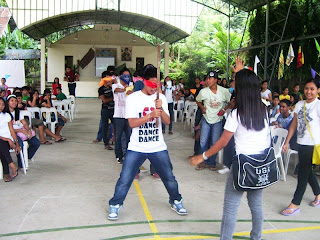
The Year for Priests starts today but we lauched it here in Davao yesterday to coincide with the 34th anniversary of Archbishop Capalla's episcopal ordination. The opening mass was held at the San Pedro Cathedral at 5:30 pm after the holy hour which started at 4:30 pm. After the mass the clergy went to the Archbishop's residence for dinner.
I am glad that Pope Benedict XV has declared the Year for Priests. This will highlight the importance of us priests in the life and mission of the Church. This is also a time to reflect on the identity and ministry of the priest. The other day, a journalist sent me an e-mail asking me what it means to be a priest especially here in Mindanao. I sent him a brief description of my understanding of the priestly ministry which I have tried to live over the years:
.
Priestly Ministry in the Philippine Context
.
1. Ministry of Pastoral Leadership and Communion
Following Christ the Good Shepherd, the priest is called to be the shepherd or the servant-leader of the Christian community.This means forming and leading the Christian community (in the parish and in the local communities/Basic Ecclesial Communities -BECs).The priest is also called to promote communion (sense of unity and sharing) among the laity and with them. This means becoming close to the flock.Pastoral leadership is to be exercised in the spirit of service, and not in terms of power, privilege or prestige. A participative and collaborative style of leadership is to be adopted, rather than the authoritarian or laissez-faire style.This ministry is grounded on a spirituality of pastoral charity and communion.
.
2. Prophetic Ministry
The priest shares in Christ's prophetic office. The ordained ministry is a ministry of the Word - of proclaiming the Word and and witnessing to the Word.This involves the task of preaching, evangelizing, and catechesis.This involves prophetic denunciation - of becoming a conscience in society and denouncing the sin and evil (including injustice, oppression, the culture of death & violence, corruption, the destruction of the environment, etc). This also means calling people to repentance and conversion.This also involves prophetic annunciation - announcing the Good News of the Kingdom, of salvation and liberation, of justice and peace, and of life.The prophetic ministry of the ordained forms the Christian community/BECs into a prophetic community - the community that listens to the Word, proclaims the Word and lives the Word, that acts as conscience of society and denounces sin and evil.The prophetic ministry is rooted in a spirituality nourished by the Word.In exercising his prophetic ministry, the priest must be ready to risk his life.
.
3. Liturgical/Sacramental Ministry
The priest exercises leadership in the liturgical/sacramental celebration of the Christian community. He enables the laity to actualize their common priesthood by promoting full and active participation in the liturgical celebration.He forms the parish and the BECs into truly priestly/worshipping community.The community that celebrates what it lives and lives what it celebrates - a life of communion with God and with one another, of unity and sharing, of self-sacrificeThe liturgical/sacramental ministry requires a spirituality nourished by the Eucharist and deepened by prayer and contemplation.
.
4. Social Action Ministry
The priest ministers to people who are poor, hungry, oppressed, victimized and dehumanized. He cannot be blind to their suffering. Social action is therefore a constitutive dimension of the priestly ministry. This is exercised in the context of the community. Thus, the priest has to form the Christian community/BECs into ministering/servant communities that address the problems that they face (poverty, hunger, injustice, violence, corruption, environmental destruction, violation of human rights) and work for social transformation that will bring about justice, peace and development.In carrying out this ministry, the priest must avoid being subservient to political ideologies and parties. He must avoid involvement in partisan politics.This ministry requires a spirituality rooted in compassion. It also requires a simple lifestyle, immersion in the life of the poor, solidarity with the poor, and forming the Church into truly the Church of the Poor.
.
In the context of the Mindanao situation where there is large number of Muslims, the priest must be involved in inter-religious dialogue (Christian-Muslim dialogue). This means befriending Muslims (especially the Imams and the Ulamas), working together with them to achieve peace, justice and development, praying with them, and identifying common or similar beliefs. The priest must also encourage lay people in the parish and in Basic Ecclesial Communities to get involved in this dialogue of life and faith.
.
PCP II considers the BECs as the realization of the vision of a renewed Church. It is a new way of being Church that requires a new way of being priest. This can be done by living out the four dimensions of the ordained ministry.




















